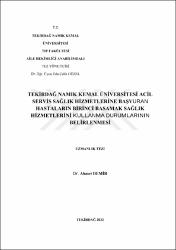| dc.contributor.advisor | Güzel, Eda Çelik | |
| dc.contributor.author | Demir, Ahmet | |
| dc.date.accessioned | 2023-04-27T20:40:54Z | |
| dc.date.available | 2023-04-27T20:40:54Z | |
| dc.date.issued | 2022 | |
| dc.identifier.uri | https://tez.yok.gov.tr/UlusalTezMerkezi/TezGoster?key=sELqxhTlFGAjsbjOuuiyCJU-0HxMSb3WcPdONVT_AzBiU6QbmPx73uiIRDbKGcBa | |
| dc.identifier.uri | https://hdl.handle.net/20.500.11776/11443 | |
| dc.description.abstract | Ülkemizdeki acil servislerin yoğun olmasının en önemli nedeni acil servise çeşitli nedenlerle başvuran acil olmayan hastalardır. Acil servislerin uygunsuz kullanımı genel olarak "kazasız veya yaralanmasız gelişen, acil servis ihtiyacı olmayan ve birinci basamakta tedavi edilebilen sağlık sorunları için acil servislerin kullanılması" olarak tanımlanabilir. Bazı hastalar şiddetli semptomlarla bile herhangi bir sağlık hizmetine başvurmazken, bazıları hafif semptomlar için ikinci ve üçüncü basamak sağlık hizmetlerini ve acil servislerini tercih etmektedir. Bu da sağlık hizmetlerinin uygunsuz kullanımına yol açmaktadır. Birinci basamak sağlık hizmetinin merkezinde yer alan aile hekimlerine, acil servislere başvuru nedenlerini ve sıklıklarını azaltmada önemli görevler düşmektedir. Çalışmamız Tekirdağ Namık Kemal Üniversitesi Acil Servis yeşil alanda 01.11.2021-01.04.2022 tarihleri arasında başvuran 250 birinci basamak sağlık hizmetlerinin kullanımını sorgulamak amacıyla yapıldı. 189 hastanın (%75,6) acile başvurmadan önce aile hekimine gitmediği, 143'ünün (%57,2) aile hekimine mesai dışında başvurmayı istediği, 217'sinin (%86,8) aile hekiminden memnun olduğu, acile şikayet olarak en sık üst ÜSYE sebebiyle (%24,4) başvuruldu görülmüştür. Aile hekimi tanıyanların ağırlıklı olarak >40 yaş grubunda olduğu, aile hekimine daha sık başvuranların kadınlar olduğunu belirledik. Eğitim düzeyi arttıkça, acil öncesi aile hekimine gitme oranının azaldığı görülmüştür. Literatür taramasında da benzer sonuçlar olduğunu görmekteyiz. Acilden önce aile hekimine giden 34 kişinin (%55,8) aile hekimi önerdiği için acile gittiği, acil için aile hekimine gitmeyen 90 kişinin (%47,6) kendisinin durumun acil olduğunu hissettiği için acil servisi tercih ettiği belirlenmiştir. Sonuç olarak hastalara verilecek birinci basamak hizmetleri ile ilgili eğitim, hastaların mevcut klinikleri hakkında aydınlatılması, mesai saatlerinin dışında da hizmet verebilmesinin düzenlenmesi, birinci basamaktaki hekime olan güveninin artırılması ve birinci basamakta görüntüleme ve tetkiklerin genişletilmesi ile acil servislerdeki yeşil alan başvurusunun azaltılabileceği düşüncesindeyiz. | en_US |
| dc.description.abstract | The most important reason for the intensiveness of the emergency services in our country is the non-emergency patients who apply to the emergency department for various reasons. Inappropriate use of emergency services can generally be defined as "the use of emergency services for health problems that develop without accident or injury, do not need emergency services and can be treated in primary care". While some patients do not apply to any healthcare service even with severe symptoms, some prefer secondary and tertiary healthcare services and emergency services for mild symptoms. This leads to inappropriate use of health services. Family physicians, who are at the center of primary health care, have important duties in reducing the reasons and frequency of admission to emergency services. Our study was carried out in order to question the use of 250 primary health care services applied between 01.11.2021 and 01.04.2022 in Tekirdağ Namık Kemal University Emergency Service green area. The most frequent complaints were that 189 patients (75.6%) did not go to the family doctor before applying to the emergency department, 143 (57.2%) wanted to apply to the family doctor outside of working hours, 217 (86.8%) were satisfied with the family doctor. It was seen that the applicants were admitted due to upper respiratory tract disease (24.4%). We determined that those who knew family physicians were predominantly in the >40 age group, and those who applied to the family physician more frequently were women. It was observed that as the education level increased, the rate of going to the family doctor before the emergency decreased. We see similar results in the literature review. 34 people (55.8%) who went to the family doctor before the emergency went to the emergency department because their family doctor recommended it, and 90 people (47.6%) who did not go to the family doctor for the emergency, preferred the emergency service because they felt that the situation was urgent. determined. As a result, we think that the green field applications in the emergency services can be reduced by education about the primary care services to be given to the patients, enlightening the patients about their current clinics, regulating their ability to provide services outside of working hours, increasing the trust in the primary care physician, and expanding the imaging and examinations in the primary care. | en_US |
| dc.language.iso | tur | en_US |
| dc.publisher | Tekirdağ Namık Kemal Üniversitesi | en_US |
| dc.rights | info:eu-repo/semantics/openAccess | en_US |
| dc.subject | Birinci Basamak | en_US |
| dc.subject | Acil Servis | en_US |
| dc.subject | Aile Hekimi | en_US |
| dc.subject | Primary Care | en_US |
| dc.subject | Emergency Department | en_US |
| dc.subject | Family Practice | en_US |
| dc.subject | Aile Hekimliği | en_US |
| dc.subject | Family Medicine | en_US |
| dc.title | Tekirdağ Namık Kemal Üniversitesi acilservis sağlık hizmetlerine başvuranhastaların birinci basamak sağlıkhizmetlerini kullanma durumlarınınbelirlenmesi | en_US |
| dc.title.alternative | Determination of the use of pri·mary healthservices of pati·ents registering to Tekirdag NamıkKemal University emergency department healthservices | en_US |
| dc.type | specialistThesis | en_US |
| dc.department | Enstitüler, Tıp Fakültesi, Aile Hekimliği Ana Bilim Dalı | en_US |
| dc.identifier.startpage | 1 | en_US |
| dc.identifier.endpage | 63 | en_US |
| dc.institutionauthor | Demir, Ahmet | |
| dc.relation.publicationcategory | Tez | en_US |
| dc.identifier.yoktezid | 743070 | en_US |



















